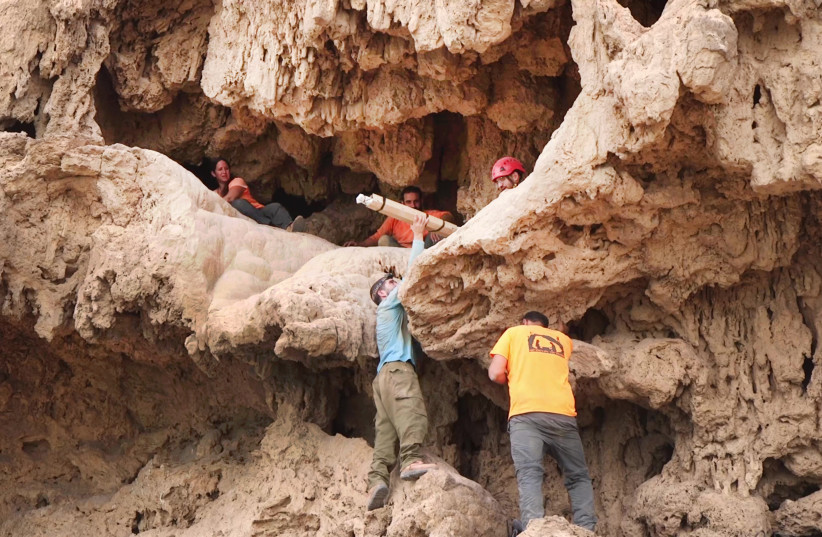Israel unearths ancient Roman swords, javelin stolen by Jewish rebels
An ancient cache of Roman weaponry including four spatha swords and a javelin head was found in a hidden chamber inside a cave at Israel’s Ein Gedi Nature Reserve, in the Judean desert, the Israel Antiquities Authority announced Wednesday in what it described as a “once in a lifetime” discovery.
The swords and javelin head were found hidden in a small chamber and preserved in an “excellent” state, the authority said. “To find one sword like this is rare, so four? It’s a dream come true,” the researchers noted. “We couldn’t believe our eyes.”
The weapons cache was most likely hidden by Jewish rebels some 1,900 years ago, the authority said, after being seized from Roman forces. One of the IAA staff said it was possible that they would detect DNA on the swords that would provide even more incredible details.
An expedition into the cave led by Ariel University’s Asaf Gayer and geologist Boaz Langford, initially planned in order to take multispectral footage of ink-written Hebrew inscriptions found on a stalactite, stumbled upon the hidden chamber where they also found pieces of process wood and leather straps, later discovered to be used as part of the swords’ scabbards.
Dr. Eitan Klein, one of the directors of the Judean Desert Survey Project, said that “obviously, the rebels didn’t want to be caught by the Roman authorities carrying these weapons. We are just beginning the research on the cave and the weapon cache discovered in it, aiming to try to find out who owned the swords and where, when, and by whom they were manufactured. We will try to pinpoint the historical event that led to the caching of these weapons in the cave and determine whether it was at the time of the Bar Kochba Revolt in 132–135 CE.”

Some of the blades were still concealed
Three of the swords were found with the blades still concealed, preserving the steel, with crafted iron and wood-made handles. The researchers identified the three swords to be spatha due to the length of their blades, measuring 60-65 cm.
The fourth sword was identified as a ring pommel sword due to its 45 cm. blade.
“It is an extraordinary privilege to take part in such a discovery and the excitement is immeasurable,” Gayer stated. “The inscription and the weapons teach us a new chapter about the way Jews used the caves of the Judean desert in the different periods.”
The ancient Roman weapons were unveiled Wednesday morning in a press conference and were featured in New Studies in the Archaeology of the Judean Desert: Collected Papers.
The rare weapons were exhibited for the first time in the press conference with IAA director-general Eli Escuzido and the researchers. The caves are under the jurisdiction of the National Parks Authority.
The volume summarizes six years of archaeological surveys and excavations carried out in theJudean Desert caves – a huge and expensive national project initiated by the IAA, together with the Ministry of Heritage and the Archaeological Office for the Military Administration of Judea and Samaria.





Comments are closed.